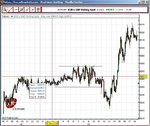I've just started out in spread betting and thought I'd post here how I'm getting on, in the hope that someone might have a few helpful comments.
I opened about six accounts in September and took full advantage of the introductory offers, netting about £500.
iii sent me a book by Malcolm Pryor "The Financial Spread Betting Handbook" which I read. I got a few points from it, but a lot of it deals with the mechanics of spreadbetting, which is easy to understand from the platforms anyway.
I really started trading about one month ago. Most of my trades have been in one particular share which is in a company which it's still possible to short, and I think is unlikely to go bust. There's no real trend in its price, so all I've been doing is buying it when the price seems low and selling when its high. I'm alert to the possibility of a trend developing in which case I would have to cut my losses if the trend is against me. I've done 14 trades on this basis and all but one have been profitable, typically netting me £50 to £100. I've traded with ODL, Capital Spreads and iii. I also bought some shares at one point with SelfTrade, thinking that the price was so low that I would like to hold onto them long term. But the price rose so quickly that I decided to sell them! I made a good profit, but clearly buying them instead of spread trading them was a mistake, because I had to pay stamp duty and commission.
I also made one trade buying euro vs GBP on Monday, seeking to profit from the current trend. I bought at 8990. The price quickly plunged to 8890. I held on, thinking that the trend had to continue. The price went up again to 8970 and then started to fall again. At 8930 I closed out, deciding that I had got this wrong and had better cut my losses. I lost £89. The price is now close to 9100, so it was clearly a big mistake to close out when I did. It's as if I'm more comfortable trading where there isn't a trend.
Not counting the promotional benefits, I'm about £1000 up in a month, which I'm pretty happy with as a beginner. And I went on holiday for a week during that month. Should I be looking to do better?
I opened about six accounts in September and took full advantage of the introductory offers, netting about £500.
iii sent me a book by Malcolm Pryor "The Financial Spread Betting Handbook" which I read. I got a few points from it, but a lot of it deals with the mechanics of spreadbetting, which is easy to understand from the platforms anyway.
I really started trading about one month ago. Most of my trades have been in one particular share which is in a company which it's still possible to short, and I think is unlikely to go bust. There's no real trend in its price, so all I've been doing is buying it when the price seems low and selling when its high. I'm alert to the possibility of a trend developing in which case I would have to cut my losses if the trend is against me. I've done 14 trades on this basis and all but one have been profitable, typically netting me £50 to £100. I've traded with ODL, Capital Spreads and iii. I also bought some shares at one point with SelfTrade, thinking that the price was so low that I would like to hold onto them long term. But the price rose so quickly that I decided to sell them! I made a good profit, but clearly buying them instead of spread trading them was a mistake, because I had to pay stamp duty and commission.
I also made one trade buying euro vs GBP on Monday, seeking to profit from the current trend. I bought at 8990. The price quickly plunged to 8890. I held on, thinking that the trend had to continue. The price went up again to 8970 and then started to fall again. At 8930 I closed out, deciding that I had got this wrong and had better cut my losses. I lost £89. The price is now close to 9100, so it was clearly a big mistake to close out when I did. It's as if I'm more comfortable trading where there isn't a trend.
Not counting the promotional benefits, I'm about £1000 up in a month, which I'm pretty happy with as a beginner. And I went on holiday for a week during that month. Should I be looking to do better?

